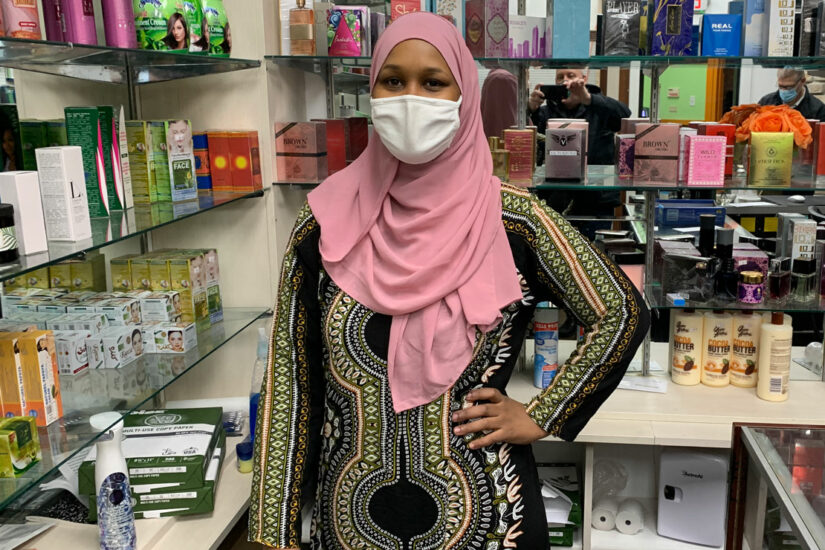
A Place for Community
When COVID-19 threatened the livelihood of the small businesses in St. Cloud’s Global Center mall, a grant program offered a lifeline.
By Elizabeth Foy Larsen
Located on the corner of 33rd Avenue and 3rd Street North in St. Cloud, the Global Center mall bustles with almost 27,000 square feet of businesses that cater to New Americans. In addition to an electronics store and a phone repair shop, three restaurants serve everything from shawarma and falafel to hot chicken wings. Clothing stores sell scarves, long skirts and hijabs. Business owners are predominantly from Somalia, Kenya, Ethiopia and Pakistan.
“The mall is a place our community can call their own,” said Nasir Khan, one of the mall’s co-owners, who also co-owns the popular New York Gyro restaurants—one of which is located in the Global Center.
The COVID-19 pandemic threatened to undo that success. Thankfully, a glimmer of hope arrived last June when the state approved the Minnesota Small Business Relief Grants program, which had an option specifically geared to businesses located in cultural malls. Qualifying facilities needed to be privately owned retail spaces with at least 25 tenants selling products with an ethnic cultural emphasis. The program was supervised by the Minnesota Department of Employment and Economic Development (DEED) and administered in Central Minnesota by the Initiative Foundation.
A Knack for Business
Originally from Pakistan, Khan moved to St. Cloud when he was a teenager and his dad accepted a professorship at St. Cloud State University (SCSU). After graduation, his father wanted him to pursue academia, but Khan felt drawn to business, starting first with a computer company. In 2015, Khan and two partners were looking for a New York Gyro location, their second, when they toured a large building that for years housed the former O’Hara’s Brew Pub & Restaurant. Their dream was to buy the entire building and turn the rest of the space into a cultural mall to serve the needs of the Central Minnesota immigrant community. They closed on the building in 2017 and by 2020 Global Center was fully occupied. Then COVID-19 arrived in Central Minnesota.
“The pandemic was the worst thing that could have happened to America, and even the world,” said Khan, who notes that he was worried not just for his own businesses but also his tenants’ livelihoods. “When they come to you and say ‘I cannot pay rent this month’ and you have had a relationship with them for two or three years, you really feel for them.” Khan said that he worked with his tenants to stretch out rent payments in installments. In March and April 2020, he says rent payments dropped to almost zero. The shutdown also put a stop to all events, which were another revenue stream for the mall.
Enter the Connector
In addition to being unable to pay rent, some tenants couldn’t afford to restock their shelves or meet payroll demands. Their situation was looking dire, but a sense of cautious optimism emerged when the state announced its cultural mall grants program, which required that 50 percent of the award be used for rent forgiveness.
While the grants offered the promise of financial assistance, the logistics of applying were daunting. “Our New American entrepreneurs typically have a harder time accessing this kind of funding,” said Jeff Wig, vice president for entrepreneurship at the Initiative Foundation. “Language barriers and a lack of familiarity with governmental institutions can present obstacles.”
To bridge the gap, the Initiative Foundation hired Ibrahim Abdi, owner of Somane Associates, a tax preparation company located in the Global Center. Abdi also is a professional “connector,” which is a kind of go-to for immigrants to learn about and navigate resources and opportunities in their new home. Abdi was born in Somalia and raised in Kenya. He moved to St. Cloud in 2010 to study economics at SCSU. When the grants were announced, Abdi worked with the mall owners and tenants to complete their applications.
“This mall is where we connect to our culture,” Abdi said. “This is where we exchange information and come together and have conversations as a community about how we can help, support and motivate each other.”
In August the Minnesota Department of Employment and Economic Development (DEED) announced that Global Center and its tenants would be awarded $110,000. The mall received $10,000 and the rest was divided amongst 16 individual tenants, primarily for rent relief but also for operating expenses. Out of dozen awards, Global Center was the only cultural mall outside the Twin Cities to receive funding.
Checks started arriving in December, a wait that Khan described as painfully long, but worth it. “No one will forget 2020,” he said. “There were a lot of people hurting.”
DEED RELIEF GRANTS By The Numbers
- 782 Total Grants Awarded
- $7,760,000 Total Dollars Awarded
- 536 Grants to Micro Businesses
- 369 Grants to Woman-Owned Businesses
- 53 Grants to Veteran-Owned Businesses
- 93 Grants to BIPOC-owned Businesses
Includes Minnesota Department of Employment and Economic Development (DEED) small business and cultural mall relief grants distributed by the Initiative Foundation.